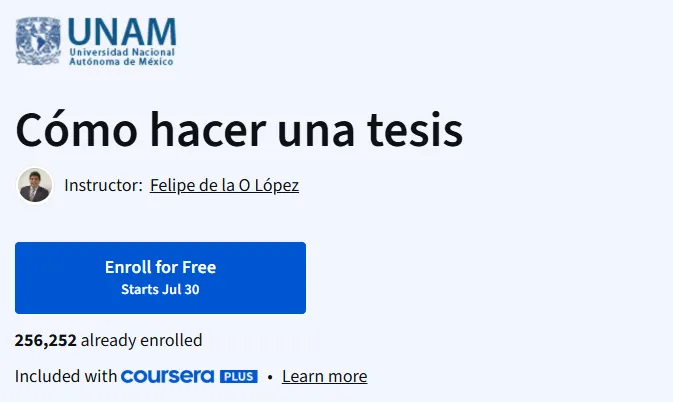What will you learn in Cómo hacer una tesis Course
Understand the essential components and structure of a thesis.
Plan, organize, and develop a research project effectively.
Improve academic writing skills for research purposes.
Apply formal methodologies and citation standards.
Program Overview
Module 1: ¿Qué es una tesis y por qué hacerla?
⏱️ 1 week
Topics: Definition and types of theses, academic purpose, personal and professional relevance.
Hands-on: Reflect on your motivations and outline initial thesis ideas.
Module 2: El problema de investigación
⏱️ 1 week
Topics: Defining a research problem, formulating objectives and hypotheses.
Hands-on: Draft your own research problem statement.
Module 3: Metodología
⏱️ 1 week
Topics: Research methods, qualitative vs. quantitative, designing instruments.
Hands-on: Choose a methodology and justify its use.
Module 4: La estructura de la tesis
⏱️ 1 week
Topics: Common sections (introduction, framework, results), logical flow.
Hands-on: Create an outline of your thesis chapters.
Module 5: La redacción y presentación de la tesis
⏱️ 1 week
Topics: Academic writing tips, citation rules, formatting, oral defense prep.
Hands-on: Write a sample abstract and reference section.
Get certificate
Job Outlook
Strong academic writing and research skills are critical in graduate education.
Supports thesis development for bachelor’s, master’s, or Ph.D. programs.
Beneficial for careers in academia, education, and research-based industries.
Enhances clarity, structure, and methodological rigor in professional writing.
Specification: Cómo hacer una tesis
|
FAQs
- Provides frameworks to reflect on personal interests and academic strengths.
- Encourages alignment of research questions with future career paths.
- Offers strategies to assess topic feasibility and originality.
- Guides brainstorming and refinement of research ideas.
- Supports connecting thesis work to potential industry or academic applications.
- Teaches planning techniques for each stage of thesis development.
- Introduces prioritization strategies for research and writing tasks.
- Encourages setting realistic deadlines and milestones.
- Provides guidance for maintaining consistent writing habits.
- Suggests methods to break large tasks into manageable segments.
- Offers tips on structuring and summarizing findings for presentations.
- Provides guidance on preparing visual aids and clear slides.
- Discusses strategies for answering questions and handling feedback.
- Emphasizes clarity, coherence, and confidence in delivery.
- Supports rehearsals and self-evaluation for oral defenses.
- Principles apply to theses across different disciplines.
- Guides structuring research that combines methodologies or perspectives.
- Encourages adaptation of writing techniques for interdisciplinary studies.
- Offers strategies for integrating diverse sources and frameworks.
- Supports customization of research design to non-traditional topics.
- Strengthens academic writing skills suitable for journal submissions.
- Teaches structuring content to meet scholarly standards.
- Provides guidance on citation, formatting, and clarity.
- Encourages critical revision to prepare work for publication.
- Helps convert thesis chapters into coherent research articles.





